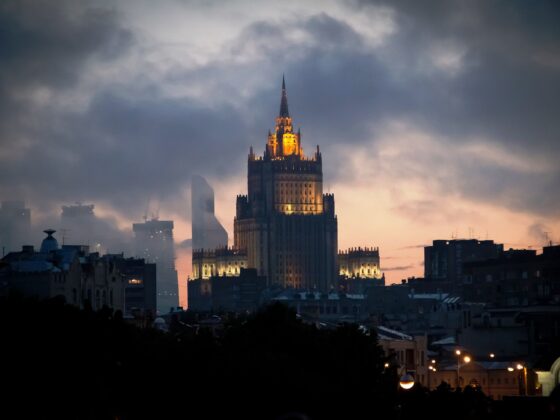PONARS Eurasia Commentary | In Europe, one now wonders whether President Emmanuel Macron and his “strategic autonomy” proposal caused damage to the political and military cohesion of the West on which the freedoms of Ukrainians and Taiwanese lie.
During his visit to China on April 8, Macron outlined to President Xi Jinping the possibility of increased EU strategic autonomy. He said the Europeans would not be willing to be “vassals of the United States” and insert themselves into the Taiwan issue. One of the main ideas was that Xi would start talking to President Volodymyr Zelensky and also convince President Vladimir Putin to end the war. The context was that the United States had begun to counter Beijing’s threatening claims on Taiwan more decisively.
Later in the month, on April 26, Xi and Zelensky had a landmark telephone conversation, but it was more solicited by Kyiv than Paris. Moreover, it followed controversial statements made by the Chinese Ambassador to France, Lu Shaye, who questioned the foundations of international law that recognize the independence of the states of the former Soviet Union.
Despite the many expectations about the long-awaited phone call between Xi and Zelensky, only two concrete results emerged. On the Ukrainian side, Pavel Ryabikin was appointed ambassador to Beijing, and Li Hui, former ambassador to Russia, was appointed special representative for agreements on what Xi calls the “political solution to the Ukrainian crisis.”
In fact, many unknowns remain about the Chinese position. “Russia” and “war” do not appear in their official meeting notes. Even their appeal for “territorial sovereignty” is not decisive because, for China, it is a mantra for its claims on Taiwan but says nothing specific for Ukraine (Which territories? All of Donbas? Crimea status configuration?) For their part, the Russian Foreign Ministry reiterated that “any call for peace can hardly be adequately perceived by the puppets controlled by Washington.” This, going full circle, is one reason Macron has been trying to present more European autonomy.
Divisive Choices on Taiwan and Ukraine
We ought to be cautious about the positions of Xi’s China, which could hamper Ukrainian counteroffensives, while it pursues hegemonic designs on Taiwan, as we reflect on the “clash of civilizations” and “clash of systems” playing out on the Europe-Russia-Eurasia chessboard.
The French leader provided some details on his European “strategic autonomy” in an April interview with Politico.eu (“Europe must resist pressure to become ‘America’s followers,’ says Macron”). His idea of an emancipated EU is with respect to the interests of the United States and mostly in relation to the EU’s economic-strategic relations with China. Macron asked Europe to be a “third pole” detached from any dependence on the “extraterritoriality of the dollar” and more decisively oriented toward strengthening its defense structures. The French proposal appeared fundamentally aimed at reassuring China—and indirectly also Russia—about “systemic challenges” coming from the League of Democracies or any decoupling of the West from the Chinese economy that President Joe Biden had mentioned.
Washington has ongoing concerns about Beijing’s intentions and actions. These include its claims to Taiwan, a major strategic semiconductor manufacturing center, and in general, its global economic penetration achieved by exploiting low domestic wages and near-slavery conditions, particularly for the Uyghurs, high CO2 emissions and massive financing programs, especially on the African continent that has proved to be sovereign debt “traps.”
For Macron, the EU should take a more cooperative attitude with China. The return is he wants them to exert pressure on Putin to launch a peace plan that restores “confidence and security” to European space. The EU has a complex relationship with China. It is the first destination for its exports, while Beijing is the third destination for European exports, but trade relations are not balanced. The EU’s trade deficit has more than tripled in the last ten years, reaching almost €400 billion last year. The Europeans want more trade with China. Macron went to China with 50 entrepreneurs and businesspeople in tow representing many sectors such as aeronautics, railway, power generation, etc.
The French initiative proved to be rather fragile and lacked a preliminary check on European convergences. Macron’s visit to China and the call for strategic autonomy provoked lively reactions in Europe and the United States. Take, for example, the April 10 headline in The Guardian: “Macron sparks anger by saying Europe should not be ‘vassal’ in US-China clash.”
Antoine Bondaz at the Fondation pour la recherche stratégique, said: “The timing of the statement is catastrophic… Macron is playing into Beijing’s hands by suggesting that France would remain neutral in a crisis scenario in the Taiwan Strait. Polish Prime Minister Mateusz Morawiecki was caustic, saying, “Instead of building strategic autonomy detached from the United States, I propose a strategic partnership with them.” Germany’s SPD party’s (Chancellor Scholtz) foreign policy representative Metin Hakverd stressed that it would be a grave mistake to divide the West on relations with Beijing: “This weakens our Western community of values. Towards China, the West, Europe, and the United States must always try to act together and not be divided.”
In the United States, impatience with anti-Euro-Atlantic Gaullist revanchism and an ungrateful France/Europe led Republican Marco Rubio to say, “If in fact Macron speaks for all of Europe, and their position now is they’re not going to pick sides between the U.S. and China over Taiwan, then maybe we shouldn’t be picking sides either. Maybe we should basically say we’re going to focus on Taiwan and the threats that China poses, and you guys handle Ukraine and Europe.”
On this chessboard with the ongoing Taiwan crisis, Paris has been excluded from recent U.S. initiatives in the context of “Aukus” (Australia, United Kingdom, United States) and “Quad” (Australia, India, Japan, United States) formats, with an example of the French military industry excluded from Australian submarine orders.
The controversy caused the Elysée Palace to clarify Macron’s positions by stating that the alliance between France and the United States does not admit any “equidistance” on common values. France intends to preserve the status quo of Taiwan, pursue peace and China’s non-involvement in the war in Ukraine, and address critical issues of international relations on the basis of the principles of international law and dialogue.
Conclusion
China’s reactions have been rather consistent and stark. “The resolution of Taiwan is a matter for Chinese people. No external force has the right to interfere,” said Chinese Defence Minister Wei Fenghe. Beijing launched a naval blockade on Taiwan disguised as drills earlier this month. On the Ukrainian issue post-Zelensky-phone-call, it is premature to tell whether a “meaningful” talk will bring meaningful actions, such as even just recognizing Moscow as an “aggressor” and “invader.”
In light of Putin’s imperial designs, we can see the positive reception of Biden and U.S. forces in Poland. And other European countries, such as Finland and Sweden, have abandoned their historic neutrality to join NATO, the only defense organization capable of concrete deterrence. Sentiments in many European states (Poland, Baltics, Germany, Italy) had to be re-directed to convince France that, in this historical moment, it is necessary to pursue a more cohesive West around NATO and the United States. A West firmly defending UN Charter principles gives strength and credibility to negotiations on Ukraine and Taiwan and the path of international trust, security, and stability.
Maurizio Delli Santi is a contributor to “Affari Internazionali” and “La Ragione” and a member of the International Law Association and Italian Association of Sociology.











